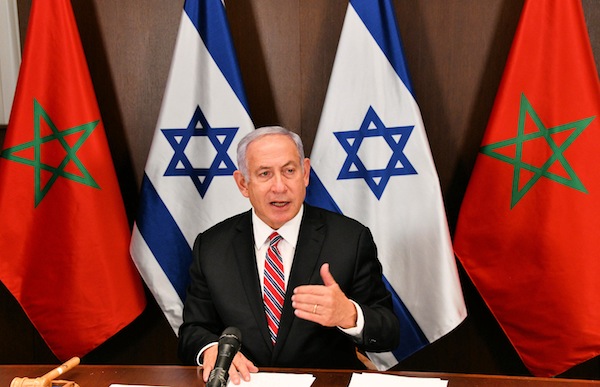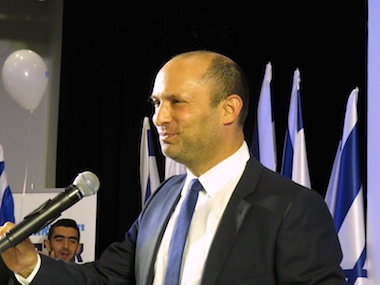David Jablinowitz, opinion editor for the Jerusalem Post, answers a question at one of his March talks at Congregation Beth Israel. (photo by Pat Johnson)
The intensely emotional debate in Israel right now centres on whether the government and military should be negotiating with Hamas for release of the hostages, extending the war or finding some combination of approaches to the situation.
David Jablinowitz, opinion editor for the Israeli English-language newspaper and media platform Jerusalem Post, spoke in Vancouver March 20. He shared with audiences at Congregation Beth Israel the rock and the hard place Israelis – including Israeli media – are between in the current crisis. Beth Israel’s Rabbi Adam Stein introduced Jablinowitz and emceed the discussion. The journalist spoke again the next night, at Shabbat services.
The Israeli government estimates that there are 59 remaining hostages in Gaza, of which 24 are believed to be alive. Testimony from rescued and released hostages say Hamas terrorists are poised to murder the captives if Israel Defence Forces ground troops approach – and this danger is in addition to the possibility that Israeli military strikes could unintentionally kill or injure Israelis held in Gaza.
“This is why there is such an emotional dispute in Israel right now,” Jablinowitz said. “Are we going to lose these 24? Because some Hamas terrorists, of whatever level, the highest or the lowest, have orders that the moment the Israelis get close, you kill the hostages.”
At the same time, Hamas is unsurprisingly not negotiating in good faith, he said. Although the terror regime has been significantly weakened, they continue to behave as though they have the upper hand.
“Hamas is playing hardball,” he said. When an individual or a group is in a weakened position, rational behaviour would see them become more amenable to compromise. Hamas appears to respond otherwise, making counter-demands that Jablinowitz characterizes as “totally unacceptable.”
“Why are they doing that? Why does Hamas have the gall to do this?” he asks. “Because it plays into their own hands.”
Israeli intelligence officials, he said, know that Hamas has been using ceasefires as an opportunity to rebuild and prepare for fresh rounds of violence.
“They keep saying, ‘No, that proposal by Israel is not good.… That’s almost good, but do that, so I can do this,’” he said. “While negotiations are going on, weeks and weeks and weeks, what’s happening on the ground in Gaza is the rebuilding of infrastructure [and] recruiting terrorists. They are just building themselves up because, as far as they are concerned, if they have their way, there will be another Oct. 7 – because the dispute with Hamas is not a dispute over territory. Hamas does not want Israel anywhere. Their charter says so. They won’t accept a Jewish state – any non-Muslim state at all, but certainly not a Jewish state.”
Another reason why Hamas feels emboldened, he said, is because the international community, like the European Union, often treats Israel and Hamas as two legitimate actors on an equivalent moral plane.
The role of Qatar, which has been wrongly accepted by world leaders as a legitimate intervenor in the conflict, deserves a far more critical eye, argued Jablinowitz.
Qatar should be on the list of state sponsors of terrorism, he said. “They are pulling the wool over the eyes of the world.”
Qatar is pretending to be a constructive party, while funding Palestinian terror, providing a haven to terrorists, and flooding the world with jihadist propaganda on social media and through their funding of courses in North American and European universities, Jablinowitz said.
This support for propaganda, among other factors, helps explain the world’s approach to the conflict.
“I’m not saying Israel is all good, I’m not saying there aren’t innocent Palestinians,” said Jablinowitz. But he takes exception to the widespread expressions of concern around blameless Palestinian civilians.
“I have to tell you, soldiers who have served there, and among the [freed] hostages themselves [in] their testimony, have said, ‘Don’t give me the “civilian innocent” business. We were there, we saw the people. There was nobody, nobody, who came to our rescue.’”
Palestinian kids and other civilians came to see where the hostages are and, Jablinowitz said, “Nobody, nobody lifted a finger to do anything.”
Relatedly, the pass the world community seems to give the Palestinians is not extended to Israel’s military, even when it goes out of its way to minimize Palestinian casualties.
“What other countries say to a terrorist, or to their enemy, ‘At 4 o’clock Wednesday afternoon, I’m attacking you, and I’m attacking you here’? But that’s what we do in order to keep down the civilian deaths,” he said. “How does the world report it? What do European and other leaders say? ‘Oh, Israel is evicting the Palestinians.’ We are trying to save their lives and save our lives at the same time. We are better to Palestinian civilians in Gaza than Hamas is to Palestinian civilians in Gaza.”
The rebuilding of Gaza, if and when it occurs, must address not only the physical devastation but the indoctrination of kids, who have been taught that “Jews are bad people, the Jews were meant to be killed,” said Jablinowitz.
“As long as you’re going to have that education, there’s no point in doing anything,” he said.
Jablinowitz acknowledged at least two contesting attitudes toward Israel’s overseas PR battle.
One side, typified in a Jerusalem Post op-ed by Alan Baker, Israel’s former ambassador to Canada, is that Israel should ignore global criticism.
“Enough. There is no point,” Jablinowitz summarizes this approach. “We have to do what we have to do.
“An alternative opinion is that maybe it’s not the hasbara [PR approach] that’s a problem, but the government’s policies,” he said.
He thinks the answer may be simpler.
“I honestly think that our cause is not as appealing. The Palestinians are so good at it because they are the downtrodden,” said Jablinowitz.
Israel had good PR when they were seen in the world’s eyes as the David to the Arab world’s Goliath.
“We were doing great in 1967, when … [it would have been] so easy to just decimate our country,” he said. “We were popular.”
That changed after Israel won the Six Day War, which remains contested in terms of who started the conflict, since Israel attacked its neighbours as they were preparing an offensive.
“That’s why we preempted in 1967,” Jablinowitz said. “You see what happens when we don’t preempt? Oct. 7 happens when we don’t preempt.”




